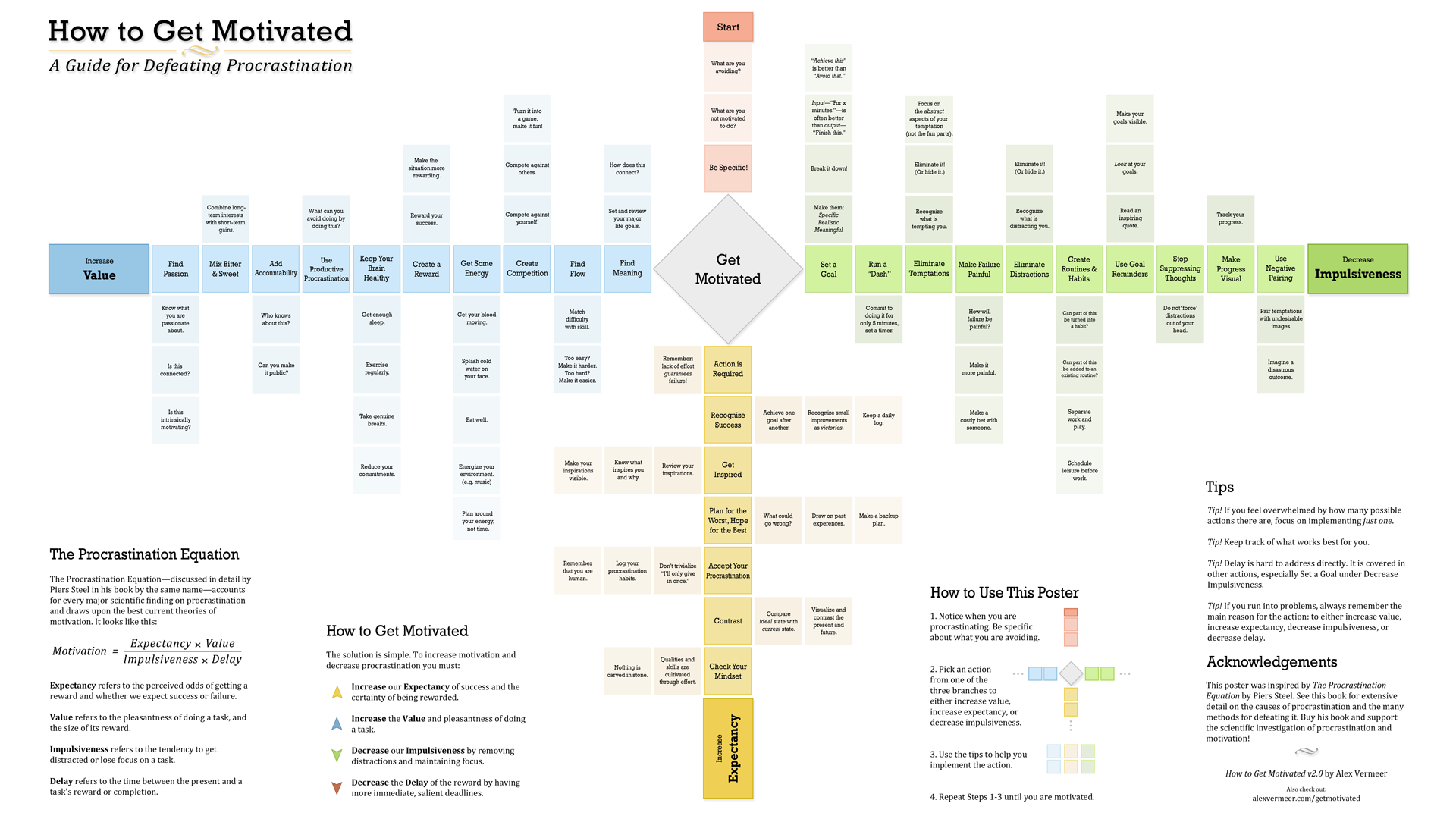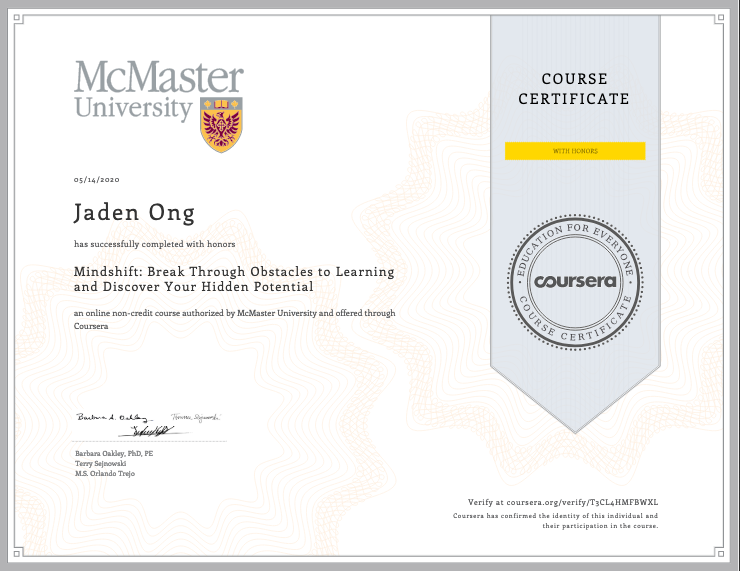Earlier this May, I took Dr Barbara Oakley’s top MOOC (Massive Open Online Course), Mindshift. The course contains study tips, career advice, and some inspiration for you to undergo your own mindshift — a shift in mindset that’ll help you in your personal, academic, and professional life.
Here are five of my favorite study tips from the course and a guide on how to get a free certificate. These tips aren’t just platitudes like “keep distractions away”, “stay disciplined” or “get driven”. They’re specific actions which you can take at any time to up your study game.
1. Curb Your Procrastination.

“Motivation equals (Expectancy times Value) over (Impulsiveness times Delay).”
— Dr Piers Steel, The Procrastination Equation
The higher your expectancy (how you perceive the reward of doing something will be) and value (how pleasant you think it will be), and the lower your impulsiveness (how likely you are to be distracted) and delay (how long until you get a reward), the more motivated you’ll be to get things done.
Simply put, easy, rewarding, and pleasant tasks motivate you to start doing stuff. So, if you want to get motivated, either increase the reward, decrease the distractions, or change your perception of the task at hand. Alex Vermeer has a very detailed flowchart inspired by Steel detailing specific actions which you can take to get motivated.
2. Finding it hard to focus? Change your environment!
Described by Dr Oakley as the coffee shop trick, changing your environment can result in a drastic increase in productivity.
Psychologists say that every habit has three parts: a cue, a routine, and a reward. The cue can be anything, from the time of day to the ever-Pavlovian doggy treat. One big cue is location. If you’ve primed your study to be where you game, watch YouTube videos, and chat with your friends, it’s going to be difficult to develop your study habit.
Your leisure habits, being easy and pleasurable, are going to tug at you whenever you try to study. A much easier way to develop a study habit is simply changing your location. By going to a cafe or library, you’ll find that your old entertainment habits don’t call out to you as much. Plus, you’ll be away from your desktop and other distractions while in the company of like-minded students.
3. Memorize With Mnemonics.
Memorization is important.
Many people think that having an understanding of things is good enough and that it’s not important to memorise things like equations and facts. But having a big picture isn’t enough to let you achieve mastery over a subject. Would you trust a surgeon if he only knew a rough picture of the human body and had to look up major arteries?
The amount of stuff we have to know as students can often be overwhelming. Plus, we’re never taught in school how to effectively learn things, and much of what our peers tell us — for example, I once heard that to memorise something you’ll have to read it thrice, copy it down twice, and read it aloud once — is unhelpful and ineffective.
Modern psychology has allowed us to discover many new ways to learn things. For instance, spaced repetition systems like Anki flashcards are based on classical psychological findings, while some mnemonics likechunking are based on cutting-edge neuroscience.
There are a ton of memory techniques out there, and one memory champion who regularly shares their memorisation tips is Nelson Dellis. If you’re interested in learning more techniques, I recommend his method of loci video and this one on memorising lines.
4. Think Like A Therapist.
Negative thoughts and self-doubt can get in the way of productive thinking and self-actualization.
In the 20th century, two psychotherapists, Albert Ellis, PhD and Aaron T. Beck, MD, changed the way we thought about low mood. They said that low moods, depression, and anxiety could be caused simply by irrational thoughts. Bouts of negativity can arise only from a person’s distorted view of themselves — for instance, that they are worthless, a loser, useless, or unhelpable.

Beck and Ellis at an APA event.
Today, their brand of psychotherapy, known as the Cognitive Behavioral Therapies (CBTs), is the primary method of treating most mental disorders. But it’s not only depressed and anxious people who experience irrational thinking — everyone does! Much of our self doubt, including feeling like an imposter, arises as a result of irrational perceptions.
By correcting these perceptions, we’re able to feel better. Therapists have narrowed about 10 to 15 kinds of irrational thoughts, or cognitive distortions, and research has shown that simply recognising a thought as a distortion and re-adjusting one’s thoughts can be monumental in reducing negative emotions.
For a more in depth look at CBT, I personally recommend the book Feeling Good by David Burns, MD, a student of Dr Beck.
5. Be Ignorant!
Focusing on a few subjects at a time can be better than working towards becoming a renaissance man.
It’s easy to stretch yourself too thin and get caught up in a web of commitments. Some people have eclectic interests and talents — leadership, the arts, programming, volunteering — but these people often have a firm grasp of one or two skills and take up their other skills as hobbies. It’s possible to learn too many things at once, and sometimes, it’s better to be selectively ignorant about things that interest you if they interfere with your other skills.
Being an all-rounder can also cause friends and acquaintances to leech onto you in order for you to help them. Some will see your skill set as an opportunity to take advantage of, so even if you do have many talents, it’s sometimes best to keep them to yourself.
Bonus: Get A Free Mindshift Certificate.

Until the end of July, Coursera is offering completely free certificates for some courses. If you’d like a free Mindshift certificate, simply follow the instructions in the link above. (You’ll have to actually complete the course though!)
Click on this link to share your study or school notes with students across Singapore: https://www.smartguppy.com/why-share
Click on this link to join the SmartGuppy Telegram channel: https://t.me/smartguppy
Find more study notes and resources on the SmartGuppy website: https://www.smartguppy.com
